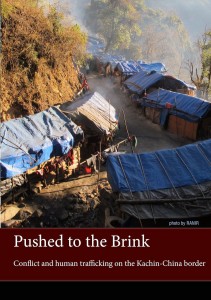Pushed to the Brink: Conflict and Human Trafficking on the Kachin-China Border
By Kachin Women's Association – Thailand • June 5, 2013 On the surface, Burma seems to be strengthening its fight against human trafficking. Burma’s long-held position in the lowest ranking of international trafficking efforts finally inched upwards a rank as a result of several policy reforms and new programs. An anti-trafficking hotline opened, as did several anti-trafficking task force offices. Anti-trafficking stickers and posters are plastered in areas across the country, and American singer Jason Mraz recently teamed with MTV to hold a massive free concert in Rangoon to raise awareness about human trafficking.
On the surface, Burma seems to be strengthening its fight against human trafficking. Burma’s long-held position in the lowest ranking of international trafficking efforts finally inched upwards a rank as a result of several policy reforms and new programs. An anti-trafficking hotline opened, as did several anti-trafficking task force offices. Anti-trafficking stickers and posters are plastered in areas across the country, and American singer Jason Mraz recently teamed with MTV to hold a massive free concert in Rangoon to raise awareness about human trafficking.
Yet at the same time, conflict rages a thousand kilometers away in northern Burma. Government army offensives have driven tens of thousands of people from their homes to the China border, vastly increasing their vulnerability to trafficking.
The stark contrast between the Burmese government’s anti-trafficking rhetoric and its actions on the ground is what we aim to highlight in this report.
The Kachin Women’s Association – Thailand’s earlier reports Driven Away (2005) and Eastward Bound (2008) had documented the growing incidence of trafficking along the China-Burma border. This new report looks at the impacts of the renewed conflict on this problem.
Download the full report here.
Tags: Armed Conflict, Human Trafficking, Kachin State, Kachin Women's Association – Thailand, Trafficking, WomenThis post is in: Human Rights, Spotlight
Related PostsBurma Army Displays Blatant Disregard for 21st Century Panglong Peace Process
On Union Day, Reappraisal of the Peace Process is Needed
ရွမ္းျပည္တိုိးတက္ေရးပါတီ၊ ရွမ္းျပည္တပ္မေတာ္ SSPP/SSA ထုတ္ျပန္ေၾကညာခ်က္
Time for the Government to Accept the Reality of Human Rights Problems, Take Effective Measures and Move Forward
Kachin Region: War Torn Displaced Village Profiles









 All posts
All posts